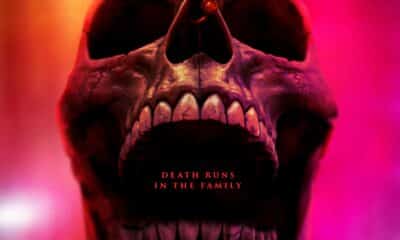The British Academy of Film and Television Arts (BAFTA) and BFI (British Film Institute) have recently been celebrating screenwriters contribution to a film’s vision with a series of lectures and talks at the headquarters of BAFTA and, of course, the BFI Southbank.
This series has been designed to give a platform to the world’s top screenwriters, as they explore their creative processes, an opportunity to share their insights with an audience of film-lovers and their peers. We wanted to share with THN readers, the recent talk with Brian Helgeland, the screenwriter behind LA CONFIDENTIAL, MAN ON FIRE, MYSTIC RIVER and THE TAKING OF PELHAM 1,2,3. Helgeland also wrote and directed the noir-thriller PAYBACK, starring Mel Gibson. We’ve picked out some great thoughts, tips and creative insight from Brian at his recent talk and first up, he spoke of his feelings on the film-making process and where he places himself in this wholly engaging form of art:
I’m not a writer, I’m a filmmaker. If I wanted to be a writer, I’d be a novelist. If I wanted to write dialogue, I’d be a playwright. But I want to make films so I’m a filmmaker, I’m no different than a costume designer, or a director. I make movies for a living. I’ve loved movies since I can remember. They made me realise there was a great big world out there. There wasn’t one where I lived, but every time I saw a movie my life seemed to get a little bit bigger.
Unfortunately, I stopped loving movies as soon as I started working on them, and never got it back. The magic is gone, and there’s no replacing it. But I fell in love with making them, so that was great. I trade one love for another. It’s taken me around the world, figuratively and literally. I’ve met my best friends through making movies, [and] my most mortal enemies. And they release me from my childhood purgatory, and I owe everything to them.
Brian also spoke of his journey to becoming a writer, how it was seemingly accidental and how it’s sometimes better just to try something different, because you never know where it may take you:
I picked up this book [called A Guide To Film School] and I realised you could go to school for film. It was in Los Angeles and I applied and the only school that would take me in the middle of a semester. I had never written before, and I had never thought of writing, but I had a class that I had to write a screenplay for. It was one of those crazy assignments, where you had to half a screenplay.
So halfway through the semester I had written half a screenplay, and I went to the teacher and said ‘what shall I do with half my screenplay?’. He said ‘well if you have time, finish it,’. So I finished it, and then when I was done I went to him again and said ‘what should I do with it?’. He said ‘I don’t know,’. There was a contest on the bulletin board, and I took off this thing and sent it off, ten dollars.
[I] went home to go fishing for the summer, and forgot all about it. Around August my Dad tracked me down and told me someone had called and I had won a writing contest. Not that I had won it, but I was one of four finalists, and they had searched for me when I was one of 50 finalists, they had searched for me when I was one of 12 finalists. But I had left my apartment in LA and hadn’t left a forwarding address. So finally they tracked me down.
I had been spared all this worry about was I going to win or not. I showed up back in LA and won second place. It was at the Director’s Guild and they had a little reception, and I was just standing around minding my own business and an agent came up to me and asked if I had an agent and gave me his card. I didn’t know what an agent was, and the next thing I knew I had an agent.
Lucky man, that Mr Helgeland. Brian also discussed what kind of film you want to look at making, if it’s the type of industry you want to go into from his personal small beginnings, to the bigger picture:
[My first film was] 976-EVIL is probably the greatest moment of my professional life. We sold it for $12,000. The cheques would come in and bounce, the first one bounced, the second one bounced. I got half of it, so I got $6,000, and finally on the third one I ran across the street to the bank and deposited it. And it held.
So that was the start of my writing career. I’m as proud of that movie as anything I ever worked on, and there was no looking back after that. I never had to get another job, I never had to worry about paying the rent again, I was a professional writer and it’s gone that way ever since.
Since then I’ve written 60-odd screenplays, 18 of which have been made into films, and three television shows. So I must know something. And I didn’t know what I knew, so when I agreed to do this I sat down and tried to analyse what I think I can pass on. I think the first thing is pick something worth writing about, which seems fairly obvious.
You want to make it compelling, and you want to make it commercial. And the thing about a commercial movie is all it has to do is make more money than it cost to make. So if your movie cost $10 to make and it makes $20 it’s commercial.
You want to bear that in mind, if you decide to write a movie about a man who talks to the tomatoes in his garden, don’t set it on Mars. You’ll be okay. But if you write that and you make that compelling and that character compelling, it’s a commercial movie. So you have to look what’s commercial.
Mr Helgeland went on to talk about the actual writing process as well, his honest thoughts on the alleged writers block (which I agree with) and on being a writer as a lifestyle choice. That well known fact that you really have to commit to the single life, well, in a sense:
I think you have to be ready to be lonely, and if you’re not then don’t do it. Really lonely. You have to think you’re an idiot all day long, know that any number of people could do a better job at what you’re doing than you are, but just do the best job that you can do. There’s something glorious about throwing time at something.
I always think a movie is a giant funnel, as big as this building, with a little tiny pinhole at the bottom and everyone, whether it’s the production or whether it’s the screenplay, you fill this enormous funnel with all the stuff and one drop comes out and that’s the movie, or the script when it’s the script. The more you dump into that funnel to get that drop, the better it’s going to be. It doesn’t mean it’s going to be any good, but that’s a whole other thing.
The next thing is writer’s block, in my list. Writer’s list is where you separate the grown ups from the children, because there is no such thing as writer’s block, it’s the price you pay for the good day you had on Thursday. You do more work sitting staring at the wall than you ever do feeling it, writing stuff out with fingers flying across the keyboard.
If you’re unwilling to go through the pain of that then you will not get the reward on the other side. Writer’s block is not an obstacle to writing, it is writing. The muse is long gone, she’s laughing at you, she’s not coming back. That’s the price you pay for the little spark she gave you at the start.
And finally, Brian talks about his favourite all-time film COOL HAND LUKE and it’s undoubted influence on his life:
No-one’s favourite movie is anyone else’s favourite movie, and that’s the beauty of them. There’s always a list of what the 10 greatest films of all time are, but for me if I’m watching tv and THE WARRIORS is on, the Walter Hill film, I’ll drop everything I’m doing and watch the Warriors run around New York and get chased by all the gangs with their faces painted.
Whereas if it’s CITIZEN KANE or THE BICYCLE THIEF I might not sit down and tune in. For no reason, these are my top 10 favourite films: FROM RUSSIA WITH LOVE, THE OUTLAW JOSEY WALES, THE FRENCH CONNECTION, KLUTE where Jane Fonda talks the entire movie, Donald Sutherland says nothing, and at the end of the movie you know everything about him and nothing about her. Which is how it’s designed, it’s fantastic. THE BAD NEWS BEARS, THE GREAT ESCAPE, THE ROAD WARRIOR, THE GUNS OF NAVARONE and MANHATTAN.
Which leaves behind one. Lucas Jackson is alive to me, he is the only many whose approval I have ever craved, I measure my life against his and continually come up short. And he’s a movie character, Lucas Jackson is the title character in COOL HAND LUKE [Screenplay by Frank Pierson] which I have watched a dozen times, but watched clips of on television hundreds of times. I don’t know how many times. It is, in my opinion, the highest achievement in the history of western civilisation.
All the BAFTA and BFI Screenwriters’ Lecture Series can now be found on iTunes and we highly recommend downloading them today. The best thing about them, is they give a true human insight into the creative process, about film and most importantly for me, how working towards what you love is infectious and every story is different.
You can download this talk and a lot more through this link.
Dan loves writing, film, music and photography. Originally from Devon, he did London for 4 years and now resides in Exeter. He also has a mild obsession with squirrels and cake. The latter being more of a hobby. Favourite movies include HIGH FIDELITY, ALMOST FAMOUS, ROXANNE, GOOD WILL HUNTING, JURASSIC PARK, too many Steve Martin films and Nolan's BATMAN universe. He can also be found on www.twitter.com/danbullock

Latest Posts
-


Film News
/ 2 days agoNew promo for ‘Popeye the Slayer Man’ arrives ahead of Prime SVOD release
Following in the footsteps of Winnie-the-Pooh, Popeye is one of the latest properties to...
By Kat Hughes -


Television
/ 4 days agoHarry Potter, Hermione Granger and Ron Weasley cast in new HBO Max series
The three main child roles in the planned Harry Potter TV series have been...
By Paul Heath -


Netflix
/ 4 days agoNetflix unveils a ‘One Piece’ announcement video
One Piece season two is officially a go and here’s a two-minute teaser for...
By Paul Heath -


Film News
/ 4 days ago‘Sinners’ will come to premium digital in one week
One of the best-reviewed studio films of the year, and indeed one of the...
By Paul Heath






